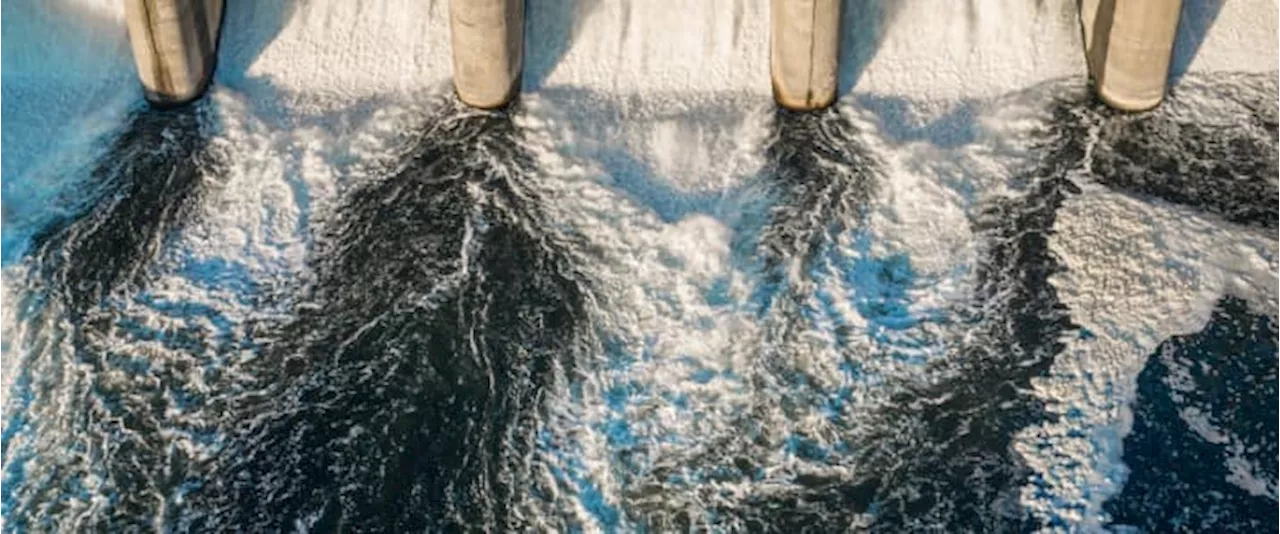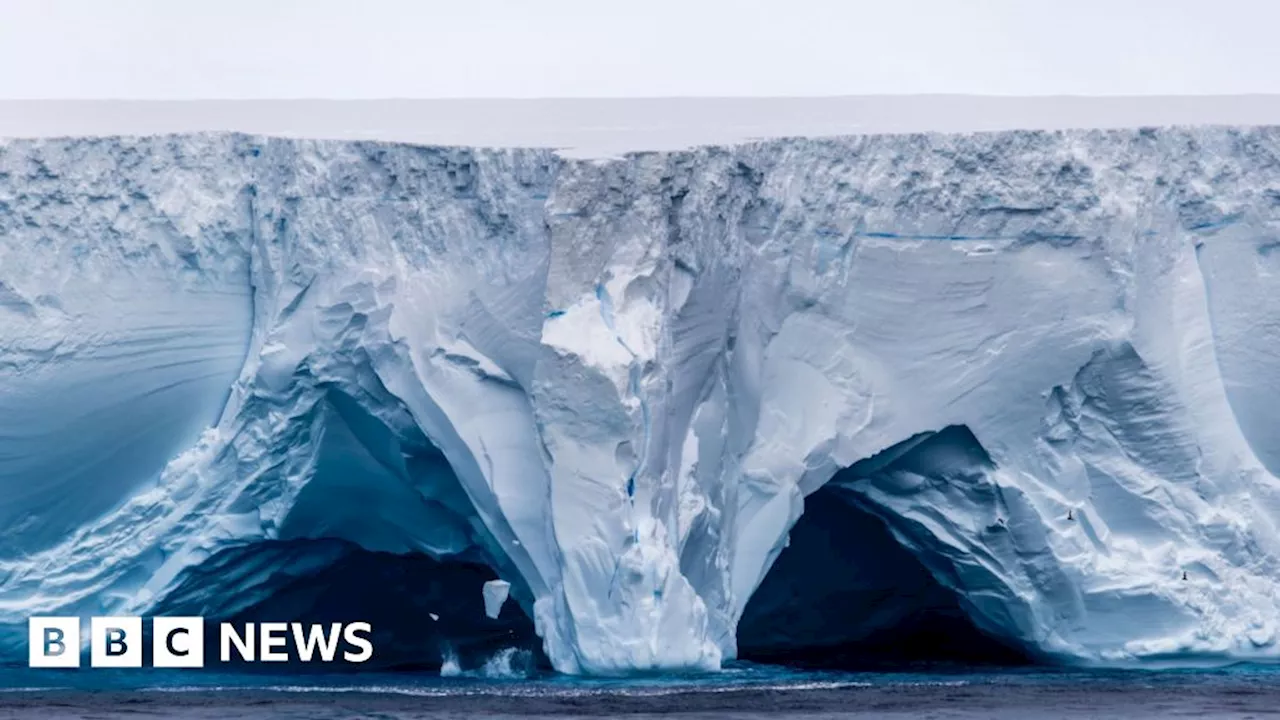The colossal iceberg A23a, the largest in the world, is on a collision course with South Georgia, a British territory renowned for its wildlife. Scientists and locals are closely monitoring its movements as it poses a potential danger to penguins, seals, and the island's fragile ecosystem.
The world's largest iceberg is on a collision course with South Georgia , a remote British island, posing a potential threat to its penguin and seal populations. This colossal iceberg, named A23a, is currently 173 miles (280 km) away from the island and spinning northward from Antarctica . Scientists, sailors, and fishermen worldwide are closely monitoring its movements through satellite images.
A23a, which calved from the Filchner Ice Shelf in 1986, has been trapped in an ocean vortex until recently. Warmer waters north of Antarctica are now melting and weakening its vast cliffs, which tower up to 1,312ft (400m). While it once measured 3,900 sq km, the iceberg is slowly decaying and now stands at around 3,500 sq km, roughly the size of Cornwall in England. Experts warn that A23a could break into massive segments any day, drifting uncontrollably around South Georgia for years to come.Past giant icebergs grounding on South Georgia's shores have tragically resulted in the death of countless birds and seals, as they were prevented from accessing feeding grounds. The island is home to significant colonies of King Emperor penguins and millions of elephant and fur seals. Marine ecologist Mark Belchier, who advises the South Georgia government, acknowledges the island's vulnerability, stating that impacts on both fisheries and wildlife are to be expected, though both possess a remarkable capacity to adapt.Sailors and fishermen report an increasing problem with icebergs. In 2023, an iceberg named A76 caused concern by coming close to grounding. Captain Simon Wallace, speaking from the South Georgia government vessel Pharos, describes how chunks of A76 resembled towering ice structures, creating an 'ice city on the horizon'. Andrew Newman from Argos Froyanes, a fishing company operating in South Georgia, emphasizes the scale of the issue, explaining that iceberg fragments range from the size of Wembley Stadiums to that of a desk and cover the entire island. Navigating through these obstacles poses significant challenges, requiring constant vigilance from sailors who use searchlights throughout the night to spot icebergs approaching from unexpected directions. The 2023 encounter with A76 was a 'gamechanger' for fishermen, according to Mr. Newman, drastically impacting operations and necessitating strict safety measures to protect vessels and crew.While ice is an integral part of life in South Georgia, experienced sailors, like Captain Wallace, know to avoid icebergs whenever possible. All three men interviewed describe a rapidly changing environment characterized by noticeable glacial retreat and fluctuating sea ice levels year-on-year. Although climate change is unlikely to have directly caused the birth of A23a, which calved long before the current warming trends, it exacerbates the instability of Antarctica, leading to more frequent breakaways of massive ice sheets. In 2023, a research team from the British Antarctic Survey aboard the Sir David Attenborough encountered A23a, seizing a unique opportunity to investigate the environmental impact of mega icebergs. PhD researcher Laura Taylor, while sailing into a crack within the iceberg's colossal walls, collected valuable water samples 400m away from its cliffs. She describes the awe-inspiring sight of a towering ice wall reaching far beyond her vision, adorned with different colours and shedding chunks as it slowly melted.Her research focuses on the influence of iceberg meltwater on the carbon cycle in the Southern Ocean. Taylor explains that this water is not ordinary; it is rich in nutrients, chemicals, and tiny marine organisms like phytoplankton frozen within. As the iceberg melts, it releases these elements into the water, altering the ocean's chemistry and physics. This process could potentially lead to increased carbon storage in the deep ocean as particles sink from the surface, effectively sequestering a portion of the planet's carbon dioxide emissions.However, the looming presence of A23a is a stark reminder of the ever-present threat of climate change and the potential consequences for fragile ecosystems like South Georgia. As the iceberg drifts closer to the island, its impact on the environment, wildlife, and human activities will become increasingly apparent
Iceberg Climate Change South Georgia Wildlife Penguins Seals Antarctica Ocean
United Kingdom Latest News, United Kingdom Headlines
Similar News:You can also read news stories similar to this one that we have collected from other news sources.
 China Approves World's Largest Hydroelectric Dam in TibetChina has given the green light to construct the world's largest hydroelectric dam on the Yarlung Tsangpo River in Tibet. The project, expected to produce three times the electricity of the Three Gorges Dam, aims to support China's clean energy goals.
China Approves World's Largest Hydroelectric Dam in TibetChina has given the green light to construct the world's largest hydroelectric dam on the Yarlung Tsangpo River in Tibet. The project, expected to produce three times the electricity of the Three Gorges Dam, aims to support China's clean energy goals.
Read more »
 China Launches World’s Largest Amphibious Assault Ship Amid Rising TensionsChina has unveiled its most powerful military asset yet, a world-leading amphibious assault ship, highlighting Beijing's rapid military modernization and potential threat to Taiwan.
China Launches World’s Largest Amphibious Assault Ship Amid Rising TensionsChina has unveiled its most powerful military asset yet, a world-leading amphibious assault ship, highlighting Beijing's rapid military modernization and potential threat to Taiwan.
Read more »
 China Launches World's Largest Amphibious Assault ShipChina demonstrates its growing military power with the launch of a massive amphibious assault ship, capable of projecting force globally and potentially supporting an invasion of Taiwan.
China Launches World's Largest Amphibious Assault ShipChina demonstrates its growing military power with the launch of a massive amphibious assault ship, capable of projecting force globally and potentially supporting an invasion of Taiwan.
Read more »
 China Builds World's Largest Airport on Artificial IslandChina is constructing the world's largest airport on a man-made island in Jinzhou Bay, Dalian. The airport will be four times larger than Hong Kong International Airport.
China Builds World's Largest Airport on Artificial IslandChina is constructing the world's largest airport on a man-made island in Jinzhou Bay, Dalian. The airport will be four times larger than Hong Kong International Airport.
Read more »
 Indonesia to launch one of the world’s largest free meals programsPresident Prabowo Subianto’s flagship programme aims to provide free lunch for all school children and pregnant mothers, reaching over 82 million people.
Indonesia to launch one of the world’s largest free meals programsPresident Prabowo Subianto’s flagship programme aims to provide free lunch for all school children and pregnant mothers, reaching over 82 million people.
Read more »
 Lithium Americas' Thacker Pass Becomes World's Largest Lithium ReserveLithium Americas' Thacker Pass project in Nevada has become the world's largest lithium reserve after the company updated its resource estimates. The proven and probable reserve estimate has surged to 14.3 million tonnes of lithium carbonate equivalent, representing a 286% increase. Measured and indicated resources have nearly tripled to 44.5Mt LCE.
Lithium Americas' Thacker Pass Becomes World's Largest Lithium ReserveLithium Americas' Thacker Pass project in Nevada has become the world's largest lithium reserve after the company updated its resource estimates. The proven and probable reserve estimate has surged to 14.3 million tonnes of lithium carbonate equivalent, representing a 286% increase. Measured and indicated resources have nearly tripled to 44.5Mt LCE.
Read more »
